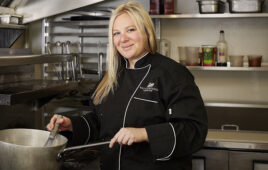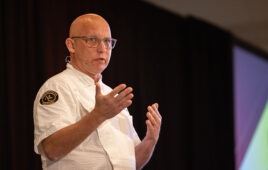Glenmoor CC’s Executive Chef, Penelope Wong, struggles with whether or not to get certified as an executive chef as she deeply questions the validity and value of what is being tested.
How many of us ask this question of ourselves? I certainly do, almost on a daily basis. This is a tale of my own conflicts regarding certification.
When I first accepted the role of Executive Chef at Glenmoor Country Club (Cherry Hills Village, Colo.), my General Manager at the time had urged me to pursue certification as a Certified Executive Chef. I entertained the notion by getting involved with my local ACF chapter, attending meetings and dinners, and networking with other club chefs who were on the same path. But, to put it bluntly, it wasn’t long after that I lost interest in what the ACF had to offer me as a young chef trying to pursue further culinary growth and achievement. I no longer felt I was benefiting with any takeaways after each month’s meetings and/or events. I wasn’t alone either. The general consensus among the group of chefs I networked with felt the same as I did. So I discontinued my participation within the organization and eventually canceled my membership.
Fast forward 20 years: In my tenure as an executive chef I have amassed a wealth of knowledge in both culinary as well as business management. I have experienced first hand what it takes to earn the respect of a team. I have learned to find the sweet balance of leading an operation in which quality is the driver yet costs are strictly maintained. I have learned how to motivate and inspire a team to envision a shared goal of personal and professional growth. I have learned how to fail. And I have endured what it takes to succeed.
In the last few years, the subject of certification has resurfaced. Developing several close friendships and relationships with my peers, I’ve been urged to reconsider certification to possibly the highest level of certification a chef can achieve. My initial reaction was of laughter. I have never viewed myself as a competitive chef. I truly believe all chefs are very good at some things and not others. My list of strengths and weaknesses regarding overall culinary knowledge would more than likely be very skewed, and not in a positive direction. I know what my strengths are as they have helped me achieve the level of success I have in my career.
Don’t misunderstand me: I believe that there is always more to learn. In my kitchen I know I will learn something new almost every day (hopefully, from one of my cooks). My belief is that we all have something to learn from one another. So why not further my culinary growth by diving into the world of certification. Ultimately, I know that if I pursue this, what I will walk away with is a significant amount of knowledge I didn’t have going in. So what am I waiting for??
Here’s the opposition: Although I have nothing but the utmost respect for my friends and peers who have gone through the processes and stages of certification, I question the validity of certification overall. I’m not saying that certification does not carry the weight of immense culinary talent and knowledge behind it. What I am saying is that I simply don’t share the same level of belief in the content which leads to certification. In my recent discussions with many certified chefs including several certified master chefs, it has been an interesting discovery that these chefs all have such different opinions regarding certification and the processes leading up to it. A fellow successful chef (already a CEC who is insanely talented and has been involved in some of the highest levels of competition that would make him a textbook candidate to pass “the exam”) shared the same sentiment as I do: “I don’t care to support what the exam is supposed to be about. So I have a bad day and don’t make a clear consommé, this doesn’t mean I’m not a great chef.” I could not have said it any better. And while a cloudy consommé would not warrant a failure during the exam, it certainly carries with it an ominous cloud of judgment.
For the record, I respect the importance of the fundamental understanding and knowledge of the basics that culinary was built on, but I question the absence of recognition regarding the evolution of culinary talent and the discoveries of new techniques.
In the progression of what falls under the massive umbrella of modern day culinary, there is a significant dichotomy of irrelevant testing material versus upholding the traditions and standards of what the exam was built on. Here’s my conflict. While I appreciate that there is a general skill level being tested, why is it that ONLY a certain few skill levels are tested in order to be deemed a ‘master’ or simply a Certified Chef? And with so much of the tested material becoming abstract and irrelevant in today’s world of what falls under the broad spectrum of “culinary,” why put forth the effort in training and the expenses involved in testing for something that people just don’t care about anymore?
In our industry as chefs, we feed the masses on a daily basis. The title ‘chef’ carries with it the weight of having a fundamental and broad base of knowledge in culinary skill, nutritional knowledge, the ability to execute a multitude of tasks and to run a responsible P&L encompassing all labor costs and costs of goods as a businesswoman (or man). The daily responsibility of a chef is to try to master the impossible in a not-so-friendly environment. In the day-to-day grind of feeding the masses, the majority of our clientele simply don’t care about the beauty of classical technique, let alone whether or not their consommé is crystal clear. It’s amusing how much of the general populace think celebrity chefs like Bobby Flay and Emeril Lagasse are Certified Master Chefs when they’re not even Certifed Executive Chefs!
In speaking with another chef who is currently very active in the certification process and is training for the exam, he offers a more positive outlook. For him, going through the certification process and working all the way up to passing the exam is an opportunity to have a voice in helping to shape the future of young culinarians the right way. He would like to have an opportunity to help implement changes to the exam to make it more relevant to today’s world of culinary to help gain more interest and accolade behind the achievement. Whenever I spend time with this Chef I find myself quickly sold and I buy into the whole idea of pursuing certification once again. On the opposition, another certified chef shared his perspective: “For some, the exam is the end goal, then it’s time to move on. For others, it’s the starting point.” (This particular individual is no longer an active chef.)
So, what now? I wish I had the answer! I struggle with this question every day. I know that this is a sensitive subject matter among chefs. I also know that there will be chefs out there reading this while talking shit about me, saying how silly and ignorant I am to the whole process and how it’s the basic fundamentals that are the backbone of our life as culinarians. And how it is that basic fundamental knowledge that should be tested among chefs who really want to achieve greatness.
I know there will be equally as many chefs reading this while talking shit about the belief that certification is the only way to prove yourself as a great chef and that they could probably outcook any certified chef any day in a real kitchen environment.
Then I ask this: why can’t we just appreciate each other as the uniquely talented chefs we all are? I’m curious to hear thoughts on this subject matter. I welcome your feedback, good or bad. You might just give me some insight to help me decide what my next move is. And I admit, it could be that I have absolutely no idea what I’m talking about. But there are a lot of certified and non-certified chefs out there who have some very strong opinions regarding the subject of certification.
Has the pot been stirred enough yet? I’m passing the spoon.




